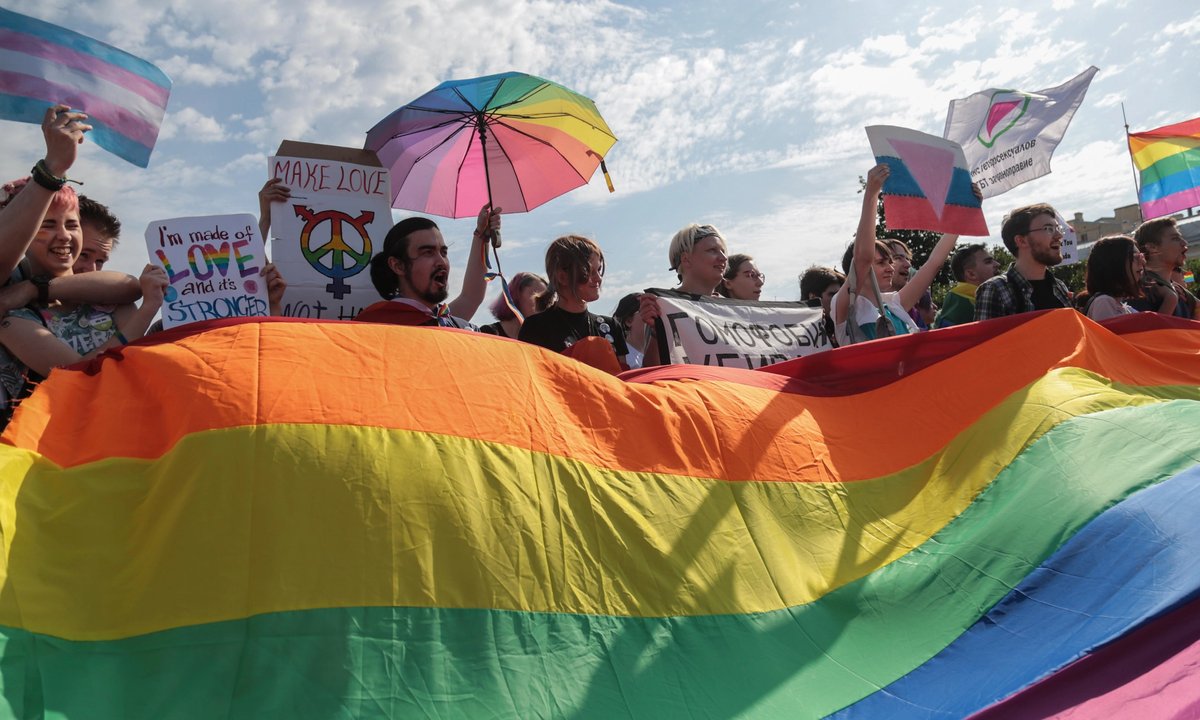
Russia’s ministry of justice announced on 17 November that it had filed a motion with the Supreme Court to declare the LGBTQ “international public movement” as extremist and outlaw it, posing a direct threat to activists and any cultural and visual expressions construable as supporting of LGBTQ rights.
In a statement, the ministry said that the “movement“—which it did not clearly define or connect to specific organisations—exhibits “various signs and manifestations of extremist orientation, including incitement of social and religious hatred.”
The motion will be heard on 30 November. In the past, a number of organisations have been similarly banned, including the Jehovah’s Witnesses in 2017, and those linked to the imprisoned opposition politician Aleksei Navalny. Prison sentences are feared as an imminent consequence for violations should the declaration relating to the LGBTQ movement be approved.
The Kremlin and the Russian Orthodox church has accused the West of promoting homosexuality, and glorified Russia as a defender of “traditional values”.
Members of Russia’s LGBTQ community from within the cultural sector have reacted to the news with concern and outrage. Pyotr Voskresensky, a doctor from St Petersburg who opened Russia’s first queer museum shortly before President Vladimir Putin signed a December 2022 law expanding a ban on “LGBTQ propaganda,” is now a political refugee in Germany.
Yulia Tsvetkova, an artist from Russia’s Far East, fled the country after the 2022 law was passed. She has been persecuted by authorities since 2019 on “pornography” and “gay propaganda” charges for her social media posts of body positive feminist images. Tsvetkova was acquitted last year after a long court battle, but the ruling was overturned this year, and in October she wrote in a post on her Telegram social media channel that a new warrant had been issued for her arrest.
In a post on 20 November, Tsvetkova described an attempt to flee Russia after her case was opened. She wrote about how LGBTQ organisations that were helping her had been too cavalier in their approach—for example, brushing off questions about safety—and that, within hours, she was detained by FSB state security forces. Now she says such organisations are making a mistake by not actively protesting the anti-LGBT extremism measures before they take effect, preferring, she feels, to protest after the fact. “If the rule about extremism is adopted, it’s really scary,” she says.
The signs of what is to come are grim, she says. “A lot of people in the country have already had their lives ruined by these laws. And the trend is depressing.“ She suggests many organisations are scared or unwilling to help.
The push for the new declaration comes at a time when Russia’s anti-LGBTQ measures have been becoming increasingly brutal, a trajectory that can be traced back to 2013 when the government passed an earlier law banning “gay propaganda”. The Chechen strongman Ramzan Kadyrov‘s regime in Russia’s Northern Caucasus has been accused of encouraging the abuse and murder of gay and bisexual men. Earlier this year, Putin signed into law a ban on gender transition.
Commentators say that a seven-year prison sentence last week against the St Petersburg artist Sasha Skochilenko was especially harsh due to her sexuality.
Speaking at the St Petersburg International Cultural Forum at the State Hermitage Museum on 17 November, Putin claimed to support cultural expression by “sexual minorities, transgender people” because their stories are “also part of society,” but also referred to them derogatorily as “transformers”—referring to their orientation.
Voskresensky, who created a queer tour of the Hermitage, noted in a subsequent Facebook post that Putin had expressed similar two-edged public sympathy for Jehovah’s Witnesses shortly before they were outlawed.
The crackdown on LGBTQ communities is even having an unintended effect on government-run organisations. Vladislav Davankov, vice-speaker of Russia’s lower house of parliament last week asked Russia’s media watchdog Roskomnadzor to officially declare that “the rainbow has nothing to do with LGBT”, in light of the fact that state-run cultural and educational organisations have become afraid of using rainbow logos, due to overly vigilant informers. The few remaining NGOs associated with LGBTQ and women’s rights, meanwhile, are rushing to remove rainbow logos to avoid punishment.

